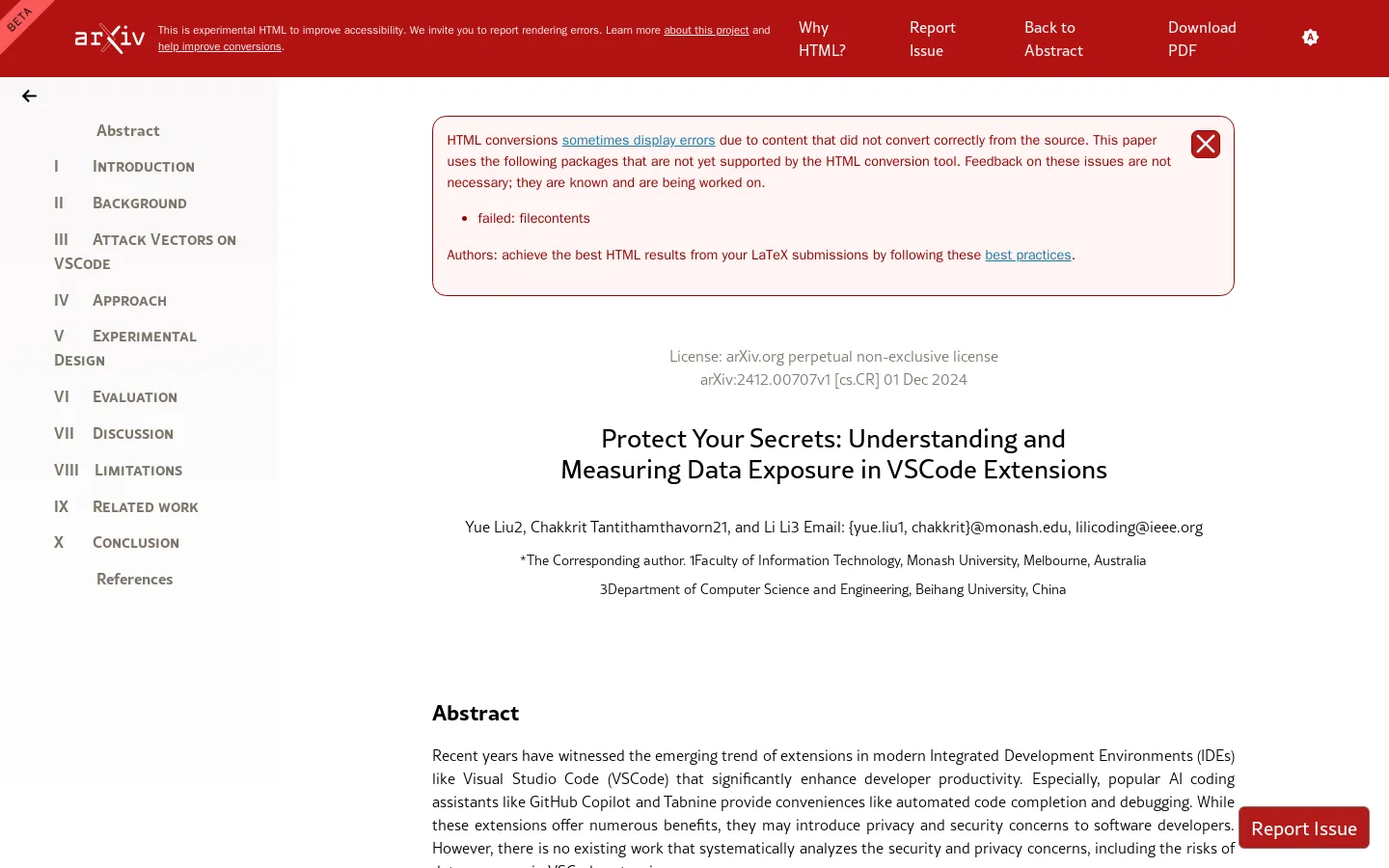
VSCode Tutorial Addresses Data Exposure Risks in Extensions
/ 5 min read
Quick take - A new tutorial has been introduced to enhance security in Visual Studio Code extensions by identifying vulnerabilities, developing a risk detection framework, and providing recommendations to mitigate data exposure risks associated with cross-extension interactions.
Fast Facts
-
Security Tutorial Launch: A new tutorial has been introduced to enhance security in Visual Studio Code (VSCode) extensions, focusing on vulnerabilities related to data exposure and cross-extension interactions.
-
Key Objectives: The tutorial aims to investigate security risks, identify high-impact vulnerabilities, develop an automated risk detection framework, and provide actionable recommendations for improving extension security.
-
Proactive Measures: Emphasizing the importance of regular updates, careful selection of extensions, and understanding permissions, the tutorial encourages developers to adopt best practices to mitigate security risks.
-
Common Mistakes: Users are advised to avoid ignoring extension permissions, neglecting updates, using unverified extensions, over-relying on extensions, and disabling security features to protect sensitive information.
-
Essential Tools: The tutorial highlights tools like the Automated Risk Detection Framework, VSCode Developer Documentation, SecretStorage API, and open science initiatives to bolster security and privacy in VSCode extensions.
Enhancing Security in Visual Studio Code Extensions
In a significant move to strengthen security within Visual Studio Code (VSCode), a comprehensive tutorial has been launched to address critical security risks associated with VSCode extensions. This initiative is pivotal in examining vulnerabilities linked to data exposure, particularly concerning the interaction between different extensions.
Key Objectives of the Tutorial
The tutorial outlines four primary goals aimed at enhancing the security landscape of VSCode extensions:
Investigate Security Risks
A systematic analysis will be conducted to identify security and privacy concerns arising from data exposure in VSCode extensions. The focus is particularly on cross-extension interactions, which have been flagged as potential weak points for data breaches.
Identify Vulnerabilities
The initiative seeks to uncover high-impact security flaws within the ecosystem of VSCode extensions. These flaws may enable malicious extensions to gain access to or manipulate sensitive information, such as passwords and API keys, that are stored or utilized by other extensions.
Develop Detection Framework
A significant component of the tutorial involves designing and implementing an automated risk detection framework. This framework will employ program analysis and natural language processing techniques to efficiently identify potential security risks inherent in VSCode extensions, thus providing developers with tools to spot vulnerabilities early in the development process.
Provide Recommendations
In addition to identifying risks and vulnerabilities, the tutorial offers actionable recommendations aimed at improving the security of VSCode extensions. By doing so, it seeks to mitigate the risks of data exposure, thereby enhancing the overall security of the extension-in-IDE paradigm.
Implications for Developers
As VSCode continues to be a leading tool among developers, reinforcing its security measures is paramount to protecting sensitive data against potential breaches. By equipping developers with the knowledge to identify and rectify vulnerabilities, the tutorial not only aims to safeguard individual projects but also enhances the integrity of the wider development community. In a landscape where data privacy is increasingly under scrutiny, proactive measures such as these are essential for maintaining user trust and ensuring the safe use of development tools.
Essential Steps for Secure Development
The tutorial outlines several essential steps for developers:
-
Preparation and Planning: Assess your goals and gather necessary materials before starting a project. Create a detailed timeline and checklist to ensure thorough preparation.
-
Implementation: Execute tasks systematically during this phase, paying close attention to detail to maintain quality.
-
Monitoring Progress: Regularly check progress to identify potential issues early on and make necessary adjustments.
-
Review and Reflection: After completion, review the entire process. Reflect on successes and areas for improvement for future projects.
By following these steps, developers can ensure a structured approach that leads to successful outcomes while minimizing potential setbacks.
Best Practices for Extension Security
To enhance understanding and efficiency when working with VSCode extensions, consider these best practices:
-
Regularly Review and Update Extensions: Keeping them up-to-date ensures you benefit from the latest features and protects against vulnerabilities patched in newer versions.
-
Select Extensions Wisely: Opt for well-reviewed and widely used extensions within the community for reliability and security.
-
Limit Installed Extensions: Each additional extension can be a potential entry point for breaches; keep only those essential for your workflow.
Common Mistakes to Avoid
Avoid these common pitfalls when using VSCode extensions:
-
Ignoring Extension Permissions: Carefully review what access an extension requires.
-
Neglecting Updates: Regularly check for updates to avoid exposing your environment to risks.
-
Using Unverified Extensions: Verify an extension’s reputation by checking reviews before installation.
-
Over-Reliance on Extensions: Evaluate whether an extension is truly necessary for your workflow.
-
Disabling Security Features: Configure settings that accommodate both functionality and protection without disabling built-in security features.
Tools and Resources for Enhanced Security
Developers can leverage several tools and resources to improve security:
-
Automated Risk Detection Framework: Integrate automated checks early in development.
-
VSCode Developer Documentation: Utilize official documentation for secure coding practices.
-
SecretStorage API: Manage sensitive information securely using this API.
-
Open Science Initiatives: Engage with community initiatives for collaborative learning and robust security practices.
By leveraging these tools and resources, developers can significantly improve the security and privacy of their VSCode extensions, fostering a safer environment for all users.



